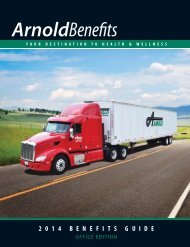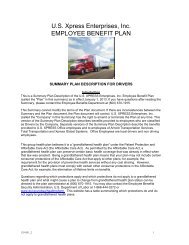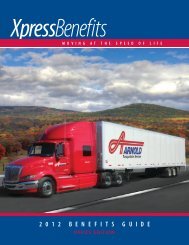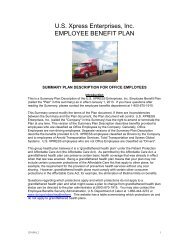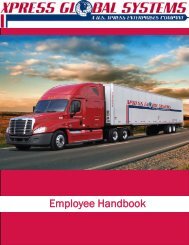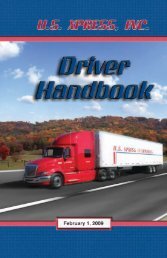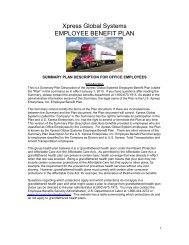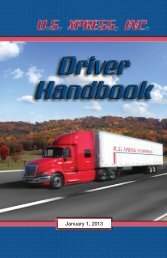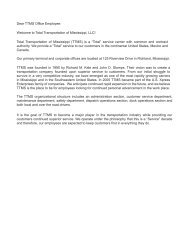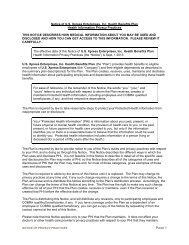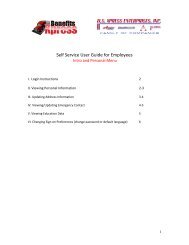2011 office employee handbook.pdf - US Xpress
2011 office employee handbook.pdf - US Xpress
2011 office employee handbook.pdf - US Xpress
Create successful ePaper yourself
Turn your PDF publications into a flip-book with our unique Google optimized e-Paper software.
EMPLOYMENT STAT<strong>US</strong>,<br />
ATTENDANCE, WORKING CONDITIONS<br />
& LEAVE POLICIES<br />
Employment Date or Date of Hire<br />
Your employment date is the date that you started working for the Company. It does not change during<br />
continuous employment and is used for calculating length of service and eligibility date to participate<br />
in the various benefit plans offered by the Company. If you terminate and are later rehired, your<br />
most recent hire date is your employment date.<br />
Employment Status<br />
Full-time<br />
For traditional shift <strong>employee</strong>s, full time status is forty (40) or more scheduled work hours per week.<br />
Full time <strong>employee</strong>s are eligible to participate in <strong>employee</strong> benefit programs.<br />
Part-time<br />
Part time <strong>employee</strong>s who are regularly scheduled to work less than thirty-three (33) hours per week<br />
are eligible for certain <strong>employee</strong> benefits based on length of employment.<br />
Temporary Workers<br />
Temporary workers are hired on a temporary basis to perform a specific job for a specific period of<br />
time, usually less than one year. Temporary workers are not eligible for any company benefits.<br />
Exempt and Non-Exempt Classification<br />
Office <strong>employee</strong>s are classified as exempt or non-exempt from overtime pay in accordance with the<br />
Fair Labor Standards Act (FLSA). Status as exempt or non-exempt is determined by job duties as<br />
required by FLSA regulations. Questions regarding exemption status should be directed to the Compensation<br />
Department.<br />
Exempt<br />
Pursuant to the FLSA and applicable state laws, exempt <strong>employee</strong>s perform administrative, professional,<br />
supervisory or management duties. Exempt <strong>employee</strong>s are not entitled to overtime pay.<br />
Non-Exempt Hourly or Salary Non-Exempt<br />
Pursuant to the FLSA and applicable state laws, non-exempt <strong>employee</strong>s are entitled to overtime pay<br />
for hours worked in excess of forty hours per week (or as required by state law).<br />
Recording Your Time<br />
You are required to maintain an accurate record of all time worked. Exempt <strong>employee</strong>s are required<br />
to complete an accurate electronic timesheet each week showing record exceptions, such as sick<br />
leave, vacation, personal leave, etc. Non-exempt <strong>employee</strong>s are required to accurately record time<br />
worked on a timecard and/or timesheet for each day worked. Your timecard and/or timesheet is very<br />
important because the information recorded on your timecard and/or timesheet is used as an accurate<br />
record of your earnings for payroll computation.<br />
22 U.S. <strong>Xpress</strong>, Inc.



